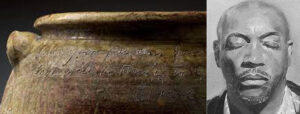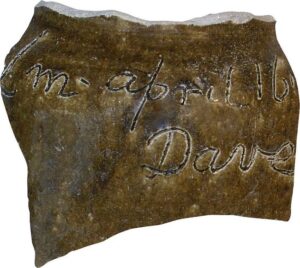Michael J. Bramwell, a Ph.D. candidate in the Department of American Studies, is collaborating with museums as they engage in social justice work—an initiative informed by a study of the past.
Unearthing history
Michael Bramwell (’14 MFA), a Ph.D. candidate in the College of Arts and Sciences’ Department of American Studies, is unearthing pieces of the past by way of an early 19th-century South Carolina potter’s poetry as he works with museums in the Southeast to re-imagine the museum experience through a lens of social justice and cultural equity.

“I had a long art career before coming back into the academy,” Bramwell said. “The Ph.D. will be sort of icing on a cake that’s already been baked. I’ve always enjoyed the life of the mind, and doctoral study connects nicely with this interest.”
Bramwell, born in the South Bronx and raised in Harlem, spent much of 2021 as a guest curator at the Museum of Early Southern Decorative Arts (MESDA), part of the Old Salem Museum and Gardens in Winston-Salem, North Carolina.
“Museums are interested in doing social justice work at this inflection moment in cultural history,” Bramwell said. His goal at MESDA is to organize exhibitions that bring Euro-centric art into conversation with art produced by Black and indigenous people of color.
“Museums are now interested in re-reading their collections in more inclusive and accurate ways,” Bramwell said. “Now, we’re looking at the voices that have not been at the foreground of collections.”
For instance, Bramwell has combed through object records and searched for keywords in order to revisit how objects are catalogued and how exhibits are curated.
“It comes down to the language that you use to describe objects and the objects that are important to collect,” Bramwell said. “Language, if I speak about certain objects in certain ways, reflects the value that I place on them.”
For example, if museums describe objects in their collection as primitive, then it communicates a certain set of values about the object and about its maker.
“It’s really critical to have the right language in place,” he said.
A piece of the past
As a Ph.D. candidate, Bramwell’s research is focused on American potter David Drake, an enslaved African American who lived in Edgefield, South Carolina. Bramwell spent part of summer 2021 with curators from the Metropolitan Museum of Art in New York City and with the Museum of Fine Arts in Boston at a plantation in rural South Carolina, exploring the remnants of pottery left behind at industrial enslavement operations, similar to where Drake was enslaved and produced pottery.
“The forests are littered with shards of pottery left behind from ceramic manufacturing operations,” Bramwell said. “These shards are only what’s visible on the surface, two hundred years after the last manufactures left the area.”

Drake, who lived during the first half of the 19th century, is well known among potters for his work, which famously incorporates lines of rhyming couplets etched onto the pottery. Bramwell’s research focuses on Drake’s couplets as words of resistance during a time in which enslaved people were typically prevented from learning how to read. Historians have focused on Drake’s contributions to the arts as a potter, and Bramwell argues that his often-overlooked couplets function as an act of early social justice work.
“The only thing scholars were talking about was how beautiful the pots and poetry were, not mentioning that he was enslaved,” Bramwell said.
Bramwell credits his advisor Bernard Herman, the George B. Tindall Professor of Southern Studies, as instrumental in showing him how American studies informs contemporary art practice and museum work.
“I thought American studies was limited to history and politics of the Americas, but I was fascinated to learn about its cultural implications for organizing exhibition and museum work,” Bramwell said. “For me, the beauty of American studies is rooted in its interdisciplinarity, which allows wide-ranging scholarship that is also responsive to social and cultural interests.”
As a Mellon Humanities for the Public Good Fellow, Bramwell has also collaborated with the Ackland Art Museum on a year-long project to reinterpret its permanent collection.
Bramwell will be featured in Southern Cultures Crafted issue in spring 2022. He has also contributed a chapter to a forthcoming book from UNC Press titled The Unfinished Business of Unsettled Things: Art from an African American South. Bramwell’s research was used to co-author a catalog essay for a forthcoming exhibition in 2022 at the Metropolitan Museum of Art titled Hear Me Now: The Black Potters of Old Edgefield, SC.
